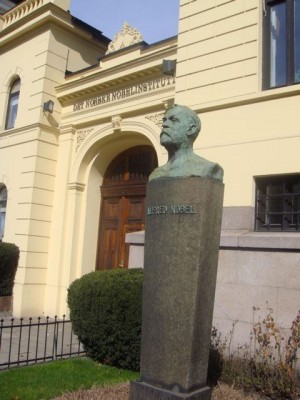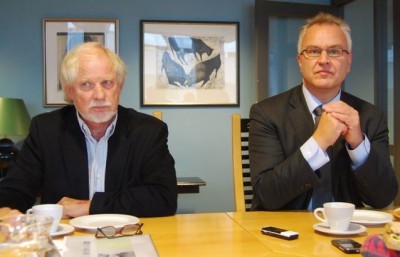Initiators of the “Arab Spring” movement who used social media to fight for democracy and human rights in northern Africa and the Middle East lead the lists of candidates deemed most likely to win this year’s Nobel Peace Prize. The prize will be announced in Oslo on Friday.

The biggest question is, perhaps, exactly who might be selected to represent what the hottest candidates themselves insist was a mass movement with no specific leader. Another question is who among the candidates has actually been nominated to receive the prize. Nominations had to be in the Norwegian Nobel Committee’s hands in February, before several of the uprisings began.
But Tunisia’s was already well underway, and that’s put Lina Ben Mhenni on the lists of Kristian Berg Harpviken, who leads the peace research institute PRIO in Oslo, and Asle Sveen, who has written a landmark book on the history of the Nobel Peace Prize. Lina Ben Mhenni, age 27, used her blog as a means of mobilizing the opposition against the Tunisian government which ultimately collapsed.
Ben Mhenni, often called a “cyber activist,” wrote about such issues as women’s rights and press freedom on her blog and when the uprising began, she traveled around the country to document government crackdowns on protesters and ran photos of those injured or killed by police. She also produced her blog under her own name, daring to report what the official media in Tunisia ignored or fabricated, and to enourage others not to be afraid. Yet she has downplayed her own role, saying the revolution in Tunisia was a combination of fighting both on the streets and online.
Events in Tunisia inspired opponents of Hosni Mubarak’s government in Egypt, where a computer engineer and Google executive, Wael Ghonim, is also mentioned as a candidate. Both Harpviken and Sveen, meeting with members of the Foreign Press Association in Oslo as the Nobel Committee huddled nearby to decide on a winner, mentioned him as playing a key role but think it may be more likely with a joint prize between Ben Mhenni representing the uprising in Tunisia and Israa Abdel Fattah in Egypt. Fattah was one of the founders of the 6th of April youth movement on Facebook. “She was early and spawned an umbrella organization,” Harpviken noted. Plus, both Abdel Fattah and Ben Mhenni are women, something Sveen and Harpviken think is an important issue at least to the four women on the Nobel Committee.

With results of the uprisings in Tunisia, Egypt and later in Libya, Syria and Yemen still unclear, Harpviken admits it would be “risky” for the Nobel Committee to award the Peace Prize to such fledgling movements since there’s always a danger the winner could go astray. “But that’s exactly the risk this committee seems to want to take,” Harpviken said, adding that the committee wants the prize to be current and relevant and may want to recognize moderate Muslims who support democracy.
The committee has also made it clear that it thinks struggles for human rights and democracy are closely linked to peace, over the protests of those who want to see disarmament efforts or humanitarian organizations recognized. Harpviken said he thought an award to a humanitarian group would “be a step backwards” for the committee, while recognition of the human rights movements that have swept the Middle East this year would be a natural follow-up to last year’s prize to Chinese dissident and human rights activist Liu Xiaobo. That prize deeply upset Chinese authorities who have cracked down on human rights activists in China and censored news of the Arab Spring, fearing it would inspire more dissent in China. Diplomatic relations between China and Norway have suffered badly and Liu, meanwhile, remains in jail.
Harpviken and Sveen also think the Nobel Committee has been impressed by the role played by the media and especially social media in pro-democracy movements. They mentioned the Qatar-based network Al Jazeera as another candidate, with Harpviken saying he’d be surprised if Al Jazeera wasn’t short-listed.
Mostly, though, the two think the Nobel Committee wants the Peace Prize to have an effect, to encourage a process leading to peace. And a prize linked to the Arab Spring likely wouldn’t have many critics, as past prizes have had. “There’s nothing wrong with not stirring controversy,” Harpviken said.
Views and News from Norway/Nina Berglund
Join our Readers’ Forum or comment below.
To support our news service, please click the “Donate” button now.

